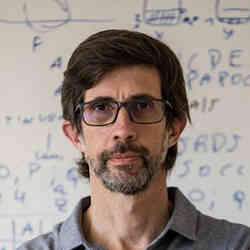
It was a Friday afternoon and I was reading a distributed systems paper. The subject was very close to my field of research and had three authors. The first two were a affliated to a known French institution, but the third had one I have never seen before: Laboratoire Cogitamus, France. The name was slightly odd since it is a Latin word that means We Think (Cogitamus ergo sumus is the plural of the cogito ergo sum quote from Rene Descartes, "I think, therefore I am").
Not too worried with the etymology of the affiliation, it was just an odd impression at the time, I decided to search for the third and last author on Google Scholar to see which other papers he or she had. (I know, I should have been reading the paper before wasting time with Googling the authors.) The scholar profile of Camille Noûs shows papers since 2019, about 200 citations and an h-index of 5. More striking is that Camille, in less than two years of activity, now counts more than half a thousand papers with a wide breadth of subjects that is more typical of a rennaissance author. The explanation for this inhuman productivity is quite simple: Camille Noûs does not exist, at least as a human.
Actually, Camille Noûs has existed as an idea since March 2020. It was created by a French research advocacy group, RogueESR. The idea is that Camille symbolizes the anonymous researcher that did not make it into the author list, but influenced and enabled the research. It could had been that five-minute talk on a coffee break that sparked an idea, or the technician that made sure the gene-sequencing machine kept working at night and the email arrived on time. The name itself, Camille, is gender neutral, and Noûs can be seen as us, the collective. We all stand on the shoulders of giants, but until mid-2020 the giant did not have a name, maybe now it has a proper one.
Another apparent objective of the initiative is to show the fragility of evaluating author merit and production merely as a function of a few numeric metrics. It also exposes the danger of elevating individual production at the cost of collaboration. These are not fringe concerns, the DORA declaration provides several guidelines to improve research evaluation and to recenter on the scientific merits of each work, and not rely exclusively on bibliometrics.
Adding Camille as an author is not without consequences, papers have been withdrawn from journals, and it would be hard to argue in what capacity did a non-existing person contribute to a specific article (like this one, as a matter of fact). What can be a funny statement from a tenured professor can be a strange CV item to explain when applying for a position.
However, once an idea is created and spreads collectively, it becomes hard to stop. It is very likely that Camille Noûs will continue publishing prolifically. Paul Erdos published around 1,500 papers during his lifetime. He was a generous collaborator who often visited other scientists to pick their brains with new problems and conjectures. Nowadays, scientists pay homage to Erdos by calculating the size of their authorship path to him; the closer the better.
As Camille keeps publishing, the number of papers will not take long to pass 1,500, and the Camille collaboration graph will keep increasing and getting more tightly connected. Maybe one day the Noûs number will tell each author how close they are to the collective effort of everyone else.
References
2. Noûs, C., We, Camille Noûs – Research as a Common, 3 Quarks Daily, April 19, 2021,
3. O'Grady, C., . Who is Camille Noûs, the fictitious French researcherwith nearly 200 papers? Science, March 16, 2021
4. San Francisco Declaration on Research Assessment, sfdora.org/read
5. Homan, P., Paul Erdos, Hungarian mathematician, https://www.britannica.com/biography/Paul-Erdos
6. Nous sommes RogueESR. rogueesr.fr
7. Google Scholar, Camille Noûs profile, https://scholar.google.com/citations?hl=en&user=368e0dwAAAAJ
Carlos Baquero is a professor in the Department of Informatics Engineering within the Faculty of Engineering at Portugal's Porto University, and is also affiliated with INESC TEC. His research is focused on distributed systems and algorithms.



Join the Discussion (0)
Become a Member or Sign In to Post a Comment